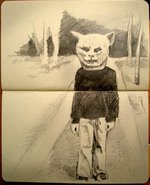"What's Left of the Campus Left?"
The other day I got an email from an editor at "The Chronicle of Higher Education," Evan Goldstein, who had read my review on Amazon of Eric Lott's THE DISAPPEARING LIBERAL INTELLECTUAL (the post immediately below). He asked me to submit a question to an online colloquy the Chronicle was hosting with Todd Gitlin called "What's Left of the Campus Left?"
The occasion was prompted by an article Gitlin had written for the Chronicle in which he responded to criticisms leveled at him by Lott and others.
Below, I reproduce my question and Mr. Gitlin's response (the whole colloquy can be found here). I can't say that Mr. Gitlin actually answered my question, but I can say that he is masterful in the way he does not answer it.
Question from Peter S., former English instructor, SUNY Potsdam: The summary of Mr. Gitlin's article on the Chronicle's website says: "Leftists in academe spend too much time attacking "heretics" within their ranks... and too little time articulating a persuasive vision of a more just world."
In The Disapperaing Liberal Intellectual, Eric Lott makes the case that "boomer liberals" such as Todd Gitlin, Richard Rorty, and others spend too much time attacking the radical left.
Lott suggests that these attacks have been counterproductive to the stated goal of many liberal writers: to get the necessary electoral heft and to drive the right wing from power. He argues that by holding the left at arm's length, by marginalizing them as unrealistic radicals who need to learn moderation, that liberal intellectuals smoothed the way for the centrist conservatism of the Clinton years and the reactionary statism of the Bush administration.
Here's my question: "Instead of marginalizing the left, shouldn't "boomer liberals" challenge themselves to find common cause with those on the same side of the political spectrum?
Todd Gitlin:The author doesn't write the Chronicle's summary. That said, you don't properly fathom the weirdness of Eric Lott's book. He displays not the slightest interest in "getting electoral heft," but rather concocts a spurious analysis blaming "boomer liberals" for "nation-love" and "political complacency with a relatively youthful face" that inhibit an uprising in behalf of his purist causes. I maintain that this view is phantasmagorical. For someone so sure of his revolutionary project, it's curious, isn't it, that Professor Lott offers not the slightest evidence that, absent his nemeses, the young revolutionaries would be going about the right insurgency. Bless the students who want to improve the world, but I haven't observed throngs of them poised for real-world action until their enthusiasm is doused by these movement-busters.
There were, however, many excellent political efforts in 2004 and I hope for more this fall. I'm also partial to the policy work of the Roosevelt Institution (rooseveltinstitution.org), on whose advisory board I sit (stand?). As for me, I'm on the board of Greenpeace USA, and spend the bulk of my time outside the classroom writing and speaking directly about politics. I encourage other like-minded instructors to do so as well. This is a citizenly duty and it is urgent.


